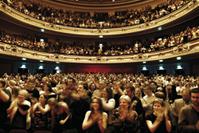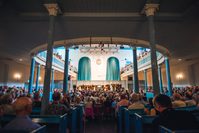
What to expect from a classical music performance
Plan Your VisitWhat to expect from a classical music performance
We are honoured to present world-class classical music in Edinburgh every August. We want to make sure that everyone feels welcome at these performances, so we’ve put together some information to help you make the most of your experience.
Our venues
We present classical music performances across three different venues; Usher Hall, The Queen’s Hall and The Hub. Each of these venues has a different feel and presents a different type of music.

The Usher Hall
The Usher Hall is home to our symphonic music series – think large orchestras and big pieces of music. Some of the music you’ll have heard before, in soundtracks and adverts if not in concert, but we also present new works of classical music at the Usher Hall. The building is a beautiful grand old concert hall with a large foyer, perfect for the scale of the music.

The Queen’s Hall
The Queen’s Hall is home to our chamber music series. This is a series of morning performances featuring soloists, duos and smaller ensembles. Lots of the music in this series is hand-selected by the artists who are performing, and they are often shorter pieces of music or songs rather than longer symphonies. The building is a serene space with beautiful blues and whites to allow the quieter music to shine.

The Hub
The Hub is home to us, the International Festival! As well as being our offices, the Main Hall of The Hub is a performance space which has been reimagined for evening music performances this year. Similarly to The Queen’s Hall, the performers here are soloists, duos and ensembles, but they are from a range of genres including classical music, jazz, traditional music and folk. The layout allows for a more informal, intimate space to allow for a closer relationship between the artists and the audience.
Clapping
Clapping is often a contentious topic in classical music, but it’s really not that complicated – we promise!
Please clap at the beginning of the concert, as the musicians and conductor come onstage, to welcome them and show your appreciation. If a soloist comes onstage, please clap them too. This is a good moment to make sure your programme is open (if you have purchased one), so you can see the names of the pieces that will be played and their order.
When everything settles down, the music will begin, and you can listen and enjoy.
Unlike jazz or pop concerts, in most classical concerts the audience doesn’t applaud during the music, they wait until the end of each piece. Not sure when the piece is over? Watch the conductor, who will lower the baton at the conclusion of a work. If in doubt, wait and follow what the rest of the audience does.
Longer pieces of music are often divided into sections called movements, with pauses between them. In general, classical musicians and audiences prefer not to hear applause during these pauses, so they can concentrate on the progress from one movement to the next.
Learning about the music
There’s no need to study before you attend, just come and enjoy! Some concertgoers find their enjoyment is deeper if they prepare for a concert by reading articles or listening to recordings, but this is very much a personal choice.
If you do want to learn more, most of our concerts have programmes available to purchase which provide background information on the music and performers. This year, we will also have audio introductions for some performances with our Festival Director, Nicola Benedetti, introducing the music that will be performed. You can find these in your pre-show email or SMS, or on the relevant event webpage.
Dress code
You may associate classical music concerts with getting dressed up, but this is completely optional! Feel free to get fancy if you feel like it, but it’s not essential.
